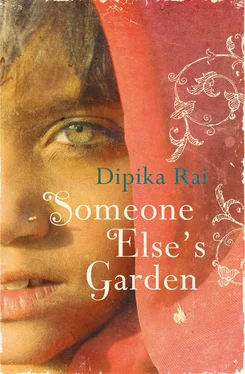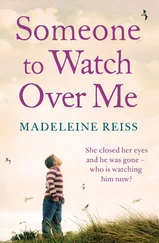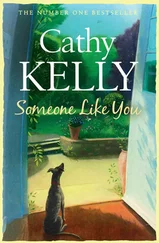‘This may be the land of Gandhi, non-violence may have worked against the British, but against these motherfuckers we need guns.’
‘Guns can never be the answer; violence is a primitive tool, the antithesis of civilisation.’
‘You are a dreamer,’ says Ram Singh. ‘All your effort won’t move one grain of the future.’
‘Yes, in a way you are right, but even so, you only make your enemies stronger by fighting them. It’s a misguided man who’ll fight without the backing of his people. It’s a foolish man who’ll fight without the backing of his god . . .’ He laughs. ‘We must all be foolish men then.’
Ram Singh feels himself pulled into his younger brother’s eyes. He shivers with irritation and says, ‘I have to go, I will be late.’
‘Don’t forget the sweets, and give Prem a ride too. I don’t think he’s ever sat in a jeep before,’ Lokend shouts before running off, his white dhoti flapping in the breeze.
At first glance he is a hunchback, with none of the awkwardness of the deformed, but at a second it is easy to see the deformity for what it is – a pet mongoose.
‘I wish he’d get rid of that damn thing. It gives me the creeps. He says he keeps it to remind him that sometimes kindness can defeat cruelty, just like a mongoose can tear the head off a snake. Why is the mongoose “kind” and the snake “cruel”, I ask you? I think he says that to make an impression on me. As if I care. Our great-great-great-grandfather was a zamindar. Should we stop now just because my younger brother doesn’t have the taste for it?’
The overseer knows better than to reply to Ram Singh’s rhetorical questions. His brother’s presence induces self-doubt. Nothing a little rum won’t cure. Babulal takes a bottle out of his kurta pocket.
‘No, not before the wedding,’ says Ram Singh. This time Lokend’s presence has an unusually long-lasting effect on him. ‘I am going to see Bapu,’ he says, without moving his reluctant feet. ‘I better go see Bapu . . .’ He looks back at the Big House. Anxious beads of perspiration have sprouted on his face. ‘I must go see Bapu now or I’ll be late.’ Managing to convince himself in stages, he moves swiftly towards the house.
The Big House shimmers in the distance with an inner light that shrieks at the onlooker. Its gleaming whitewash puts a glare in the eye. It has been that way since it was built more than one hundred years ago. It has stood gleaming through every summer, every monsoon and every addition. Its glow comes not just from the trueness of the whitewash, but also from the belief in its power. It stands apart and above the brown plane, a jewel of prosperity and control.
Many families living in Gopalpur owe their existence to the Big House. Most of their forefathers worked on it during the great drought. Singh Sahib’s great-great-great-grandfather, the then king, kept extending the building as a means of paying the villagers in grain. The construction stopped only when the rains arrived, and it was at its completion that Gopalpur got its name.
In the old days this land of ravines was a malingering nomadic expanse, visited mostly by cattle. They would arrive from nowhere and everywhere to leave great heaps of dung pats for the wandering tribes to collect. The tribes’ people named the place Gobarpur: gobar – cow dung, pur – site. Cow dung site. But Gobarpur didn’t sound elegant enough to support the shining Big House, so Singh Sahib’s great-great-great-grandfather changed the name to Gopalpur – the abode of Gopal, the flute-playing, blue-skinned god of love. And to firmly establish Gopalpur as the true eponymous land of the love god, the great-great-grandfather planted a virtual forest of mango trees brought all the way from Vrindavan, from the very same legendary orchards in which the young Gopal was believed to have seduced throngs of milkmaids with a lot more than just his flute-wielding prowess. Few trees survive today, but their fruits are blessed with extraordinary sweetness. Come dusk, there is at least one flute to be heard in Gopalpur, perpetuating its name.
The Singhs didn’t remain kings much longer after Gobarpur became Gopalpur. They were forced to give up the throne and their privy purses when the country achieved independence from British rule.
Gobarpur or Gopalpur, king or zamindar, the people still look to the Big House for sustenance.
Ram Singh strides to his father’s room, a man with a purpose. The slaps of his sandals echo so loudly in the corridor that he has to turn and look to make sure he is alone. Asmara Didi is standing outside Singh Sahib’s room, waiting as it were for Ram Singh’s appearance. He is annoyed.
They enter the room together.
Singh Sahib, the widowed father of the two boys, is in bed. An untidy chess game is spread before him like an unfinished meal. From his vantage point Ram Singh can see that the black king is in a snare he can’t get out of. He feels in much the same snare himself.
‘You are white, I hope?’ He mocks his father. ‘Which one of his pet dogs did he get to play with him today?’ Ram Singh asks Asmara Didi. She has no intention of replying. In days long past father and son might have played a game of chess together, but that is no longer the case.
Singh Sahib looks at Asmara Didi and lifts his left hand slightly. That one tiny movement serves as a swath of communication between them. Her knees are stiff and both crack mutinously at different times as she kneels to touch his purple gout-infected toes with her forehead.
‘Oh sht . . . op.’ Singh Sahib absolved Asmara Didi from touching his feet months after she cured his wife Bibiji of her mysterious illness and made her strong enough in the ‘female department’ to bear him a child. But Asmara Didi has neither acknowledged her status in the Big House nor her employer’s wishes.
Still kneeling, she removes Singh Sahib’s quilt with one flick, a little like a magician revealing the finale to a most complicated trick, and places his turban on his head in an unpunctuated movement. Singh Sahib, standing six feet five inches, the biggest man in the region, at his heaviest one hundred and ten kilos, was never a fat man. Now, uncovered and turbaned, his immense frame takes over the room.
Singh Sahib’s right arm dangles like a curtain pull by his side. Asmara Didi places the limp limb in his lap, palm facing upwards. It falls to the ground. Once again she places it with great care in his lap. Again, it slips. She has to discipline the unruly curled hand a few times before it will stay still.
Ram Singh moves closer to his paralysed father, allowing the dead limb no dignity in his scrutiny. Asmara Didi wrinkles her brows and throws her head quickly forward and back a few times like an old mare. Move back, she says silently. Move back or else.
Even now, five years since his father’s illness, Ram Singh feels uncomfortable standing taller than him. He bends his knees and straightens. Sitting, head higher than Singh Sahib’s, is unthinkable. Technically, standing is disrespectful too, but standing is more deferential than sitting.
The son looks from the shining buckles on his sandals to his father’s feet. He stopped touching them long ago. He still remembers the day that his father spitefully kept pulling them out of reach till Ram Singh was almost chasing those elusive toes on his hands and knees like a dog.
Singh Sahib makes an initial attempt to speak from the mobile side of his mouth. He only manages to leak spit like a dripping tap. Asmara Didi wipes his spit with a towel. It is clear the old man puts up with the woman’s fussing with a degree of annoyance. But he has grown used to her. He installed her in the Big House years ago to keep his fading wife company. He has a lot to thank her for, including his own two boys. She was clever with her potions even then.
Читать дальше












